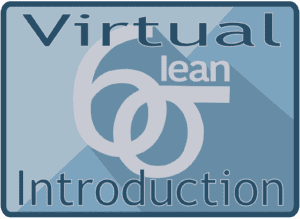Why?
Lean Six Sigma (LSS) is, at its best a team-based approach involving a group of people typically working together around a flip chart or ‘brown paper’ wall with post-its or gathered around analysing a set of data.
There is an increasing need for LSS practitioners to be capable of continuing to operate in the virtual world. Lockdowns have forced many to work from home for the first time and in many organisations, LSS projects require teams from different locations to work collaboratively together.
Working effectively across organisational and geographical boundaries to solve problems is one of the attractions of the LSS approach.
Without needing time-consuming travel and committing whole days to bring the team together for a relatively short workshop, DMAIC projects can be accelerated through virtual team working and running shorter more efficient DMAIC team workshops using online collaborative tools.
This one-day interactive workshop will demonstrate a wide range of innovative collaborative approaches and how they can be applied at different stages of LSS projects. Download the course pdf here
The price of this course is £245 (+ VAT)
10% discount for BQF members, £220.50 (+ VAT)
Who is it for?
Lean Six Sigma practitioners at all levels of proficiency who need to collaborate effectively in virtual project teams.
This one day course is designed for people who already have at least a white belt level of LSS knowledge but all belt levels and LSS champions/ sponsors will benefit from seeing how LSS tools can be applied in the virtual world. The course assumes that delegates already understand the basics of LSS. The course also acts as a one-day revision session for more experienced LSS practitioners who are interested in updating and applying their knowledge of LSS in the virtual world.
How?
The course follows the LSS DMAIC problem-solving method and shows through practical application how to use a range of online team collaborative tools at each stage of a typical project. Delegates will be encouraged to learn through doing, guided and supported by the highly experienced certified MBB Catalyst trainers.
On the Agenda-
- Best practice approaches for online facilitation
- Roadtesting a number of apps and tools for collaborative working
- Working through the phases of a Lean Six Sigma project (Define, Measure, Analyse, Improve, Control) and using some of the key tools ‘virtually’, including process mapping, root cause analysis and ideas generation
- Building genuine commitment and engagement from stakeholders
- Refreshing and developing Lean Six Sigma knowledge
- Building enthusiasm for making Lean Six Sigma projects happen in the current situation
Learning outcomes-
A practical understanding of how to apply online collaborative tools throughout the life of a typical LSS project.
Delegates will have the opportunity to build their own confidence in a safe environment with expert support.
Takeaways-
All course materials will be accessible through the web during and after the training including the work delegates have completed during the course.
Catalyst will also provide each delegate with access for 12 months following the course to the white belt programme of videos as a revision and training aid for them to use within their own teams. This consists of 20 videos developed within Catalyst and is a subset of Catalyst’s online learning system, which houses a library of online training courses encompassing training at all LSS belt levels, the business improvement zone. www.Businessimprovementzone.com
- Overview
-
Why?
Lean Six Sigma (LSS) is, at its best a team-based approach involving a group of people typically working together around a flip chart or ‘brown paper’ wall with post-its or gathered around analysing a set of data.
There is an increasing need for LSS practitioners to be capable of continuing to operate in the virtual world. Lockdowns have forced many to work from home for the first time and in many organisations, LSS projects require teams from different locations to work collaboratively together.
Working effectively across organisational and geographical boundaries to solve problems is one of the attractions of the LSS approach.
Without needing time-consuming travel and committing whole days to bring the team together for a relatively short workshop, DMAIC projects can be accelerated through virtual team working and running shorter more efficient DMAIC team workshops using online collaborative tools.
This one-day interactive workshop will demonstrate a wide range of innovative collaborative approaches and how they can be applied at different stages of LSS projects. Download the course pdf here
The price of this course is £245 (+ VAT)
10% discount for BQF members, £220.50 (+ VAT)
- Who is it for?
-
Who is it for?
Lean Six Sigma practitioners at all levels of proficiency who need to collaborate effectively in virtual project teams.
This one day course is designed for people who already have at least a white belt level of LSS knowledge but all belt levels and LSS champions/ sponsors will benefit from seeing how LSS tools can be applied in the virtual world. The course assumes that delegates already understand the basics of LSS. The course also acts as a one-day revision session for more experienced LSS practitioners who are interested in updating and applying their knowledge of LSS in the virtual world.
- How?
-
How?
The course follows the LSS DMAIC problem-solving method and shows through practical application how to use a range of online team collaborative tools at each stage of a typical project. Delegates will be encouraged to learn through doing, guided and supported by the highly experienced certified MBB Catalyst trainers.
- On the Agenda
-
On the Agenda-
- Best practice approaches for online facilitation
- Roadtesting a number of apps and tools for collaborative working
- Working through the phases of a Lean Six Sigma project (Define, Measure, Analyse, Improve, Control) and using some of the key tools ‘virtually’, including process mapping, root cause analysis and ideas generation
- Building genuine commitment and engagement from stakeholders
- Refreshing and developing Lean Six Sigma knowledge
- Building enthusiasm for making Lean Six Sigma projects happen in the current situation
- Learning Outcomes
-
Learning outcomes-
A practical understanding of how to apply online collaborative tools throughout the life of a typical LSS project.
Delegates will have the opportunity to build their own confidence in a safe environment with expert support.
- Takeaways
-
Takeaways-
All course materials will be accessible through the web during and after the training including the work delegates have completed during the course.
Catalyst will also provide each delegate with access for 12 months following the course to the white belt programme of videos as a revision and training aid for them to use within their own teams. This consists of 20 videos developed within Catalyst and is a subset of Catalyst’s online learning system, which houses a library of online training courses encompassing training at all LSS belt levels, the business improvement zone. www.Businessimprovementzone.com
-


